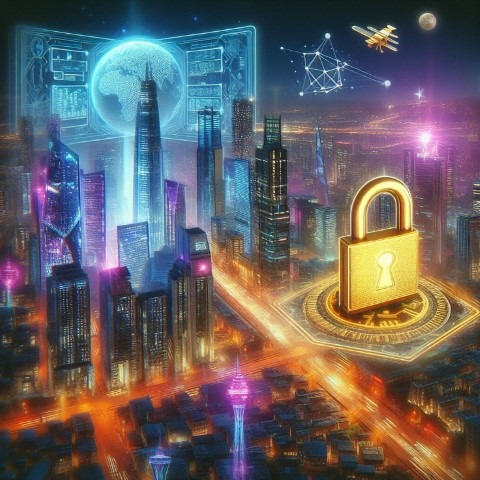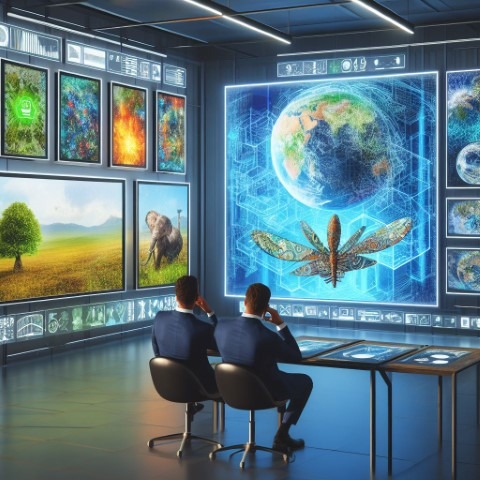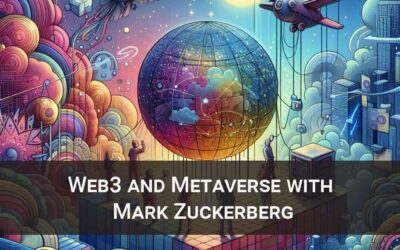Non-fungible tokens (NFTs) have found applications across various industries.
From redefining art ownership to reshaping the gaming frontier, NFTs have become the linchpin of innovation across industries. Explore our curated list of fascinating use cases, illustrating how NFTs are more than just digital assets—they’re the building blocks of a decentralized future.
Here are 13 Different Utilizations for NFTs:
1. Digital Art and Collectibles
2. Gaming
In the realm of gaming, Non-Fungible Tokens (NFTs) are utilized to represent in-game assets such as characters, skins, weapons, and even virtual real estate. These tokenized assets, unique and verifiable, can be bought, sold, and traded by players, adding a new dimension to the gaming experience. This use of NFTs in the gaming industry has not only enhanced the value of in-game assets but also transformed the way players interact with games.
3. Virtual Real Estate
Non-fungible tokens (NFTs) are used to represent ownership of virtual land or property in online worlds. These digital assets, each with a distinct and verifiable ownership record, can be bought, sold, and developed by users. This has not only created a new market for virtual real estate but also added a layer of tangibility to the otherwise intangible online worlds. The use of NFTs in this context signifies a fascinating convergence of technology and imagination
4. Music and Entertainment
Non-Fungible Tokens (NFTs) have emerged as a groundbreaking tool allowing Musicians and content creators to tokenize their work, transforming songs, albums, or other digital content into unique, verifiable assets. This allows fans to own unique editions of these works, fostering a deeper connection between artists and their audiences. The advent of NFTs in this space has not only redefined the concept of ownership but also opened up new avenues for artists to monetize their creativity.

5. Domain Names
Non-Fungible Tokens (NFTs) have been leveraged to represent ownership of domain names on decentralized systems. These projects have tokenized domain names, creating unique and verifiable digital assets that can be owned, bought, and sold. This innovative use of NFTs has not only democratized domain ownership in the decentralized web but also added a layer of security and transparency to the process. It signifies a significant shift in how we perceive and manage digital identities in the blockchain space.
6. Identity and Credentials
Non-Fungible Tokens (NFTs) provide a secure and tamper-proof method to represent and verify personal or professional achievements. By tokenizing these credentials, NFTs create unique, verifiable digital assets that can be owned and shared. This not only ensures the authenticity of these achievements but also simplifies their verification process. The use of NFTs for digital identities and credentials signifies a major advancement in how we manage and verify digital identities.

7. Supply Chain and Provenance
Non-Fungible Tokens (NFTs) ensure transparency and authenticity in the supply chain by creating a unique, verifiable record for each item. This use of NFTs has not only enhanced the traceability of goods but also increased trust among stakeholders. The advent of NFTs in supply chain management signifies a major advancement in how we track and verify the authenticity of goods.
8. Ticketing and Events
Non-Fungible Tokens (NFTs) provide a secure and traceable method to verify event attendance, transforming tickets into unique, verifiable digital assets. This use of NFTs can help prevent fraud and ensure the validity of tickets, enhancing trust and security in the event industry. The advent of NFTs in ticketing signifies a significant shift in how we manage and verify event attendance.
9. Education
Non-Fungible Tokens (NFTs) allows for secure and easily verifiable proof of educational achievements. The use of NFTs not only ensures the authenticity of these credentials but also simplifies their verification process. The advent of NFTs in the academic sector signifies a major advancement in how we manage and verify educational achievements.
10. Charity and Fundraising
Non-Fungible Tokens (NFTs) provides transparency and traceability in fundraising efforts, ensuring that every donation is accounted for and can be traced back to its source. The advent of NFTs in charitable initiatives signifies a major advancement in how we manage and verify charitable contributions, fostering trust and accountability in the sector.
11. Virtual Goods and Merchandise
Non-Fungible Tokens (NFTs) allow users to own and trade unique items, enhancing their digital experience. The use of NFTs not only democratizes ownership of digital goods but also opens up new avenues for companies to engage with their customers. The advent of NFTs in this space signifies a major shift in how we perceive and value virtual goods and merchandise.
12. Insurance and Risk Management
Non-Fungible Tokens (NFTs) are unique, verifiable digital assets that provide a transparent and verifiable record of coverage, ensuring the authenticity of these policies. The use of NFTs not only enhances the traceability of financial instruments but also increases trust among stakeholders. The advent of NFTs in this space signifies a major shift in how we manage and verify financial instruments.
13. Healthcare
Non-Fungible Tokens (NFTs) ensure data integrity and privacy, providing a secure method for managing sensitive health information. The use of NFTs not only enhances the security of patient records but also simplifies their sharing and verification process. The advent of NFTs in healthcare signifies a major shift in how we manage and verify health information, fostering trust and accountability in the sector.

In summary, NFTs have emerged as versatile tools that extend far beyond the realm of art, offering transformative solutions across various industries. From revolutionizing how we perceive and trade digital assets to enhancing transparency in supply chains and ensuring the integrity of personal and professional achievements, NFTs have woven themselves into the fabric of our digital lives. As a technology fostering innovation, trust, and creativity, NFTs stand as a testament to the boundless possibilities blockchain brings. While challenges persist, the potential for positive impact on individuals and industries alike positions NFTs as a noteworthy force in shaping the future of our interconnected world.



![The State of NFTs in 2023 [Video]](https://www.nftzenmaster.io/wp-content/uploads/2023/01/state-of-nfts-in-2023-400x250.jpg)
0 Comments